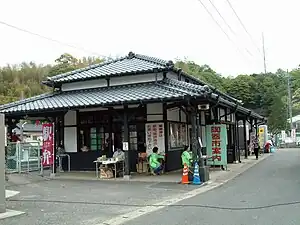Kami-Arita Station 上有田駅 | |
|---|---|
 | |
| General information | |
| Location | Arita, Nishimatsuura, Saga Japan |
| Coordinates | 33°11′25″N 129°54′21″E / 33.1902°N 129.9057°E |
| Operated by | |
| Line(s) | ■ Sasebo Line |
| Distance | 25.7 km from Hizen-Yamaguchi |
| Platforms | 2 side platforms |
| Tracks | 2 |
| Construction | |
| Structure type | At grade |
| Accessible | No – platforms linked by footbridge |
| Other information | |
| Status | Unstaffed |
| Website | Official website |
| History | |
| Opened | 1 October 1898 |
| Previous names | Nakataru (until 1 May 1909) |
| Passengers | |
| FY2015 | 108 daily |
| Location | |
 Kami-Arita Station Location within Japan | |
Kami-Arita Station (上有田駅, Kami-Arita-eki) is a train station in Nakataru 1-chōme, Arita, Saga Prefecture, Japan. It is operated by JR Kyushu and is on the Sasebo Line.[1][2]
Lines
The station is served by the Sasebo Line and is located 25.7 km from the starting point of the line at Hizen-Yamaguchi.[3] Only Sasebo Line local services stop at this station.[4]
Station layout
The station, which is unstaffed, consists of two staggered side platforms serving two tracks with a siding branching off track 2 and running on the other side of platform 2. The station building is an original Meiji-era timber structure built in 1909 when the station opened for passenger traffic. Access to the opposite side platform is by means of a footbridge.[3][2][5]
The station is normally unstaffed but some types of tickets are available from a kan'i itaku agent outside the station. In addition, during the "Arita Pottery City", a major ceramic pottery fair held in the town of Arita during Golden Week, a ticket window with a POS machine would be set up.[6]
 Arita Station during Golden Week 2017. The sign says "Arita Pottery City information centre".
Arita Station during Golden Week 2017. The sign says "Arita Pottery City information centre". A view of the platforms and tracks. The siding can be seen to the far left.
A view of the platforms and tracks. The siding can be seen to the far left.
Adjacent stations
| ← | Service | → | ||
|---|---|---|---|---|
| Sasebo Line | ||||
| Mimasaka | Local | Arita | ||
History
The private Kyushu Railway, in building a line to Nagasaki, had opened a track from Tosu to Saga and Takeo (today Takeo-Onsen) by 5 May 1895 and had expanded to Haiki by 10 July 1897. On 1 October 1989. the station was opened as an intermediate station on the existing track between Takeo-Onsen and Haiki. At the time it was named Nakataru (中樽) and was for freight only. When the Kyushu Railway was nationalized on 1 July 1907, Japanese Government Railways (JGR) took over control of the station. On 1 May 1909, passenger services commenced and the station was renamed Kami-Arita. On 12 October 1909, track from Tosu through Kami-Arita and Haiki to Nagasaki was designated the Nagasaki Main Line. On 1 December 1934, another route was given the designation Nagasaki Main Line and the official starting point of the Sasebo Line was moved to Hizen-Yamaguchi. As such, Kami-Arita became part of the Sasebo Line. With the privatization of Japanese National Railways (JNR), the successor of JGR, on 1 April 1987, control of the station passed to JR Kyushu.[7][8]
Passenger statistics
In fiscal 2015, there were a total of 39,518 boarding passengers, giving a daily average of 108 passengers.[9]
Environs
- National Route 35
- Arita art museum of ceramics porcelain
See also
References
- ↑ "JR Kyushu Route Map" (PDF). JR Kyushu. Retrieved 3 March 2018.
- 1 2 "上有田" [Kami-Arita]. hacchi-no-he.net. Retrieved 24 March 2018.
- 1 2 Kawashima, Ryōzō (2013). 図説: 日本の鉄道 四国・九州ライン 全線・全駅・全配線・第5巻 長崎 佐賀 エリア [Japan Railways Illustrated. Shikoku and Kyushu. All lines, all stations, all track layouts. Volume 5 Nagasaki Saga area] (in Japanese). Kodansha. pp. 25, 71. ISBN 9784062951647.
- ↑ "上有田" [Kami-Arita]. JR Kyushu official station website. Retrieved 24 March 2018.
- ↑ JR Kyushu (2013). JR九州のひみつ [Secrets of JR Kyushu] (in Japanese). PHP Institute, Inc. p. 47. ISBN 9784569814933.
- ↑ "上有田駅" [Kami-Arita Station]. jr-mars.dyndns.org. Retrieved 24 March 2018. See images of tickets sold.
- ↑ Ishino, Tetsu; et al., eds. (1998). 停車場変遷大事典 国鉄・JR編 [Station Transition Directory – JNR/JR] (in Japanese). Vol. I. Tokyo: JTB Corporation. pp. 22–3, 225, 227. ISBN 4-533-02980-9.
- ↑ Ishino, Tetsu; et al., eds. (1998). 停車場変遷大事典 国鉄・JR編 [Station Transition Directory – JNR/JR] (in Japanese). Vol. II. Tokyo: JTB Corporation. p. 728. ISBN 4-533-02980-9.
- ↑ "佐賀県統計年鑑(平成28年版)" [Saga Prefecture Statistics Yearbook 2016 Edition]. Saga Prefectural Government website. Retrieved 23 March 2018. See table 12-7 at section under Transportation and Communications.
External links
- Kami-Arita Station (JR Kyushu)(in Japanese)